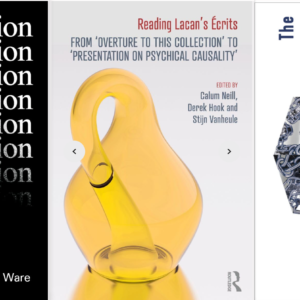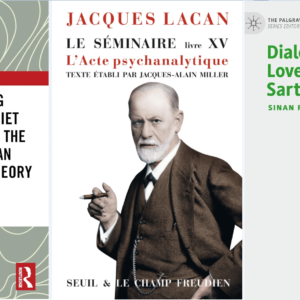News – February 2019
A special offer from Routledge to all LacanOnline.com visitors – from now and until further notice LacanOnline.com readers will get a 20% discount and free global shipping on all titles. Use this link and enter the discount code S031 at the checkout. Routledge has a huge catalogue of psychoanalytic publications, with recent Lacanian releases including: Bogdan Wolf’s Anxiety Between Desire and the Body, a close reading of what Lacan says in Seminar X; Studying Lacan’s Seminars IV and V, edited by Carol Owens and Nadezhda Almqvist; and the first volume of the new Reading Lacan’s Écrits commentaries, edited by Stijn Vanheule, Derek Hook, and Calum Neill. Many more titles will be released later this year, including Agnieszka Piotrowska and Ben Tyrer’s new volume on Femininity and Psychoanalysis: Cinema, Culture, Theory which is due out in July. Check this page for further updates in the coming months.
Due to arrive from other publishers later this month, Samo Tomšič – author of 2015’s acclaimed The Capitalist Unconscious: Marx and Lacan and 2017’s Psychoanalysis: Topological Perspectives – will be releasing his upcoming book The Labour of Enjoyment Towards a Critique of Libidinal Economy on 15th March. The full description is available via the link above, and it can be pre-ordered here or from Amazon.
Darian Leader’s latest, Why Can’t We Sleep?, will be released on 7th March by Penguin. Looking at our contemporary relationship to sleep and the plethora of ways in which its problems are approached, Leader surveys the history of sleep, dreams, and insomnia from pre-Industrial Revolution ‘double sleep’, Freud’s own theory at the end of the nineteenth century, the discovery of REM sleep in the twentieth, and the rise in sleeping pill prescriptions, popular apps, and blue-light filters on our screens in more recent times.
Further ahead, due out in August will be Wittgenstein and Lacan at the Limit: Meaning and Astonishment by Maria Balaska. Looking in particular at the two thinkers’ treatments of astonishment, Balaska draws parallels between them on the basis of their shared dissatisfaction with the way astonishment is explained through meaning. She argues that “this frustration and difficulty with meaning reveals a more fundamental characteristic of our sense-making capacities – namely, their groundlessness”, and proposes that Lacan and Wittgenstein offer an alternative: to acknowledge our ability to creatively participate in meaning-making.
An English translation of Barbara Cassin’s Jacques the Sophist: Lacan, Logos, and Psychoanalysis was announced last month for release in October. Cassin undertakes a re-reading of Lacan’s seminar through the lens of the Ancient Greek philosophers, pointing to what she labels Lacan’s “philosophistises” as evidence of his own sophistic influences, which she finds in the shared querying of the relationship of meaning to language and the nature of truth between Lacan and the Sophists.
Due for release at the end of the year is Jernej Habjan’s Ordinary Literature Philosophy: Lacanian Literary Performatives between Austin and Ranciere which offers a Lacanian consideration of J.L. Austin’s ordinary language philosophy. It studies its reception by Lacan and other continental philosophers such as Derrida, Butler, Ranciere and Ducrot using case studies drawn from Hollywood blockbusters, Shakespeare, and the May 68 protest movement. Habjan’s work is the first extended Lacanian engagement with Austin’s theory of speech acts and other parts of the latter’s thought.
Psychoanalytic publishing house Unconscious in Translation is offering 20% off selected titles, plus a free copy of J.-B. Pontalis’ Brother of the Above, with any order placed until the end of March. Newly-translated work by Lacan’s pupils include titles by Laplanche and Pontalis respectively. Claire Nouvet’s essay on The Unconscious in Translation series has been re-published in the latest issue of the International Journal of Psychoanalysis which you can read in full here.
Lastly among publications, readers may be interested to know that Julia Kristeva’s latest, Passions of Our Time, is due out later in March from Columbia University Press. Containing a collection of essays on the subject of time, Kristeva examines time in birth and rebirth, events and emergencies, and the existential dimension of time in the context of new technologies. It also contains a group of essays that draw on her psychoanalytic study of maternal eroticism, and another on the continued importance of psychoanalysis today.
Among events, Lacan In Scotland is hosting a talk later in March exploring the praxis of Evidence Based Medicine using psychoanalytic theory. Anticipation and Medicine – Why Screening for Cancer May Be a Bad Thing, with Dr Owen Dempsey, will take place on Weds 20th March at Edinburgh Napier University. Entry is free and booking can be made via Eventbrite.
In London, The SITE for Contemporary Psychoanalysis will be holding two Open Evenings for those interested in undertaking a clinical training, on 15th March and 6th April respectively. More details available on their site.
On 6th April, the Irish Circle of the Lacanian Orientation will be hosting its 7th Study Day on ‘Urgent Cases and the Lying Truth’, with special guests Bernard Seynhaeve, President of the NLS, and Pamela King, Secretary of the NLS. Details of the event, which takes place in Dublin, will be available here.
The Freud Museum London will be running a one-day intensive course with Lorenzo Chiesa on ‘Lacan and Kafka: Knowledge, Enjoyment, and the Big Other’ on 19th May. While Lacan only makes three references to Kafka in his work, the course will show how these passages can illuminate key aspects of Lacanian psychoanalysis. More details and the accompanying reading list are on the Museum’s site.
A new interview with Lacanian analyst (and Lacan’s translator) Bruce Fink is now available on Soundcloud, courtesy of Politics Theory Other. The interview ranges over a number of areas, including the contemporary perspective of psychoanalysis in the treatment of depression and anxiety disorders, the reasons people go into psychoanalysis, and why Lacan chose the difficult style of presentation that he is famed for. (On the latter point, Fink correctly notes that often in the Écrits a particular paper will start with two or three pages of impenetrable prose, after which it will get easier).
Finally, the frequently-updated Lacanian Review Online carries an interview with Ruth Ronen by Marie-Hélène Brousse about Ronen’s book Lacan with the Philosophers, which received its English translation in March last year. Among other things Ronen discusses why Lacan needed to reference Aristotle’s concept of the soul in talking about the psyche, Pascal’s wager in relation to ethics, and Hegel’s work on the slave-master dialectic for a psychoanalytic view of death.
Got news? Get in touch.




Leave a Reply